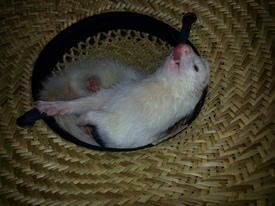So my Doc has me seeing a nutritionist...

kdids520
Posts: 6 Member
and the nutritionist has some great points, but I'm feeling pretty blah about it.
My diet specifically geared towards PCOS management includes:
-no diary
- no soy
- no sugar
- no "white" carbs
- limited fruits (only with first meal of the day, and has to be with a protein)
yes:
-egg whites
-veggies
-lean proteins
- plain oatmeal (once a day, only in AM)
- low carb/no sugar protein shakes
etc.
Also taking synthroid, Metfotmin and DCI supplements.
And so my question to you gals: Would this be a sustainable lifestyle for you? Because I feel like I'm being punished and that there's no way in hell I'm going to be able to make this a workable lifestyle. Or maybe I'm just being a carb loving brat.
My diet specifically geared towards PCOS management includes:
-no diary
- no soy
- no sugar
- no "white" carbs
- limited fruits (only with first meal of the day, and has to be with a protein)
yes:
-egg whites
-veggies
-lean proteins
- plain oatmeal (once a day, only in AM)
- low carb/no sugar protein shakes
etc.
Also taking synthroid, Metfotmin and DCI supplements.
And so my question to you gals: Would this be a sustainable lifestyle for you? Because I feel like I'm being punished and that there's no way in hell I'm going to be able to make this a workable lifestyle. Or maybe I'm just being a carb loving brat.
0
Replies
-
I don't think I could as fruit is one of my main snacks everyday
What r dci supplements? I too take metformin (but also armor thyroid, b-12 injection and a prenatal vitamin)0 -
I'm definitely struggling with it. It's also super "cooking-intensive" and I really don't have time for that. I need to come up with a plan that will stick with my food preferences and time constraints. Any suggestions?0
-
That wouldn't be sustainable for me either. One of the joys of a Low Carb diet, which is strongly recommended for PCOS, is eating full fat dairy. Soy I understand as there have been studies that show an estrogen increase in women and men who use/drink a lot of soy. Low carb is sustainable for me, but in order to cut out carbs you have to increase fats. I'm not sure the reasoning behind them putting you on a low carb AND low fat diet. That doesn't make any sense to me. If you decrease one, you increase the other. Your body can burn carbs OR fat for energy, protein is used as a building block for things like muscles. So on a low carb AND low fat diet, what are you burning? muscle?
What ever you decide to do, i'd recommend a crockpot. You can throw everything in and then have food when you come home. No major cooking or clean up. You'd be surprised how many things you can make in a crockpot, not just soups and roasts. Check out some books or internet sites that have the types of recipes you've decided to go with.0 -
It's doable but so extremely hard....especially during the holiday season. I have yet to do my follow-up, with my Dr., from my PCOS diagnosis and I'm almost positive she will recommend I see a nutritionist...sigh...
I say take baby steps and I agree with Alliwan about the crockpot.0 -
Try experimenting with the advice. Try limiting some of those things for a period of time to see how your body reacts and make adjustments from there. I also don't agree with the no dairy thing. Not sure what the purpose there would be. I agree with Alliwan - increase fats. Full fat dairy is heavenly.0
-
I have gestational diabetes so I was expecting your diet to be something like mine (also seeing a nutritionist) but it is totally different. I can have up to 30 g carbs for breakfast, 15 g carbs for morning snack, 45 g carbs for lunch, 30 g carbs for afternoon snack, 45 g carbs for dinner, and 45 g carbs for bedtime snack. She told us the exact opposite, which is that we should not have our fruit for breakfast, but that might be a pregnancy thing (pregnancy hormones are strongest in the morning, that's why the # of carbs I can have throughout the day increases as the day goes on). I can comfortably do whole grain pasta, whole grain/high fiber bread, some potatoes, fruit, etc. I've found that sweets have a bad effect on me, except I found frozen Greek yogurt bars that are fine. (I test my blood sugar four times a day so I know what has a bad effect - although not until afterward, LOL). I can tell you that it's hard at celebrations and things like that but I've gotten used to it. Testing blood sugar has definitely helped me - and I can't take the only oral diabetes med they'll give during pregnancy since I am allergic to it so the next step if I can't control with diet is injecting insulin and I'd rather stay away from that.
One thing I'm really surprised about is the dairy. We are really supposed to focus our diets on dairy, especially cheese and milk. Surprised to see you have to cut it out. I always get organic from hormone-free cows because the last thing I need is someone else's crazy hormones added to mine, but other than that, I don't see the issue too much.0 -
That wouldn't be sustainable for me either. One of the joys of a Low Carb diet, which is strongly recommended for PCOS, is eating full fat dairy. Soy I understand as there have been studies that show an estrogen increase in women and men who use/drink a lot of soy. Low carb is sustainable for me, but in order to cut out carbs you have to increase fats. I'm not sure the reasoning behind them putting you on a low carb AND low fat diet. That doesn't make any sense to me. If you decrease one, you increase the other. Your body can burn carbs OR fat for energy, protein is used as a building block for things like muscles. So on a low carb AND low fat diet, what are you burning? muscle?
What ever you decide to do, i'd recommend a crockpot. You can throw everything in and then have food when you come home. No major cooking or clean up. You'd be surprised how many things you can make in a crockpot, not just soups and roasts. Check out some books or internet sites that have the types of recipes you've decided to go with.
This. Low fat, low carb, high protein is actually very bad in general (see also: rabbit starvation), and even if it wasn't, it doesn't work well for us, anyway, because protein triggers insulin production, too (which is the main cause of weight issues in women with PCOS).
I think the idea of low carb, low fat comes from the combination that doctors know that low carb works for women with PCOS, and the idea that fat is "bad" (especially for people with cholesterol issues, which we are usually prone to). Unfortunately, they're barking up the wrong tree with that mindset.
To the OP - I highly recommend checking out the Paleo and Primal ways of eating. It has a lot of the same dietary goals, but provides it in a way that is generally more sustainable. There are also a ton of recipes out there to help make meal preparation easier.
Here's a quick sample of a day's worth of meals:
Breakfast:
Omelet with things like mushrooms, scallions, tomatoes, and green peppers, using coconut oil or butter to grease the skillet and some strawberries
Alternatively - higher fat variations may do something like Bulletproof Coffee, which is a good quality coffee with a couple of tablespoons of butter and coconut oil, blended until everything is mixed well.
Lunch:
Salad with blend of lettuces such as romaine, bibb, and arugula, and perhaps fresh spinach, topped with sunflower seeds, grilled chicken (or bacon, Canadian bacon, or steak), almonds, tomatoes, and avocado
Dinner:
Stuffed peppers with ground turkey, diced chiles, onion, and spices, with a side of deviled eggs (using avocado)
"Oh no, whole eggs!" You say, "what about the cholesterol?" Dietary cholesterol has been proven to have little to no effect on serum cholesterol. If your cholesterol is high, it's very likely not because of cholesterol in the food you eat, but something else. Additionally, egg yolks have a number of awesome nutrients, including Omega-3 fats, choline (a micronutrient that helps prevent fatty liver), essential fats and fat-soluble vitamins, calcium, iron, and folate, most of which are thrown out if you ditch the yolk.
"So much fat!" Actually, the above plan doesn't have much fat. That said, the fats above are largely monounsaturated, which are pretty much universally accepted as good fats. The butter and coconut oil are at least partially saturated fats, but like the cholesterol in eggs, saturated fat is not the enemy. The saturated fats in coconut oil, especially, are medium chain triglycerides, which are basically pure energy for the body. Butter, like egg yolks, has a bunch of nutrients in it, including similar fat soluble vitamins to what's in eggs. Regardless, you still need to get fuel from somewhere. When you reduce carbs, you have to increase fats accordingly.0 -
I hear you on this, but I have some advice!
Did your nutritionist set up small steps for you to incorporate these major changes? Don't fret - you won't be able to do this 100% overnight, unless you are feeling very ill from the PCOS/have high motivation to change right away.
If it is any help, start by adding veggies to every meal. Get friendly with seasonings: Mrs. Dash (no salt/low salt, etc.) As far as one commenter said, you absolutely will have to up your fats to counter the decrease in carbs. Google paleo recipes for starters and yes a crockpot will help you. Full fat dairy is NOT your only option: look to natural nut butters and avocado. I eat egg white with avocado and mixed veg every morning with salsa on top. I don't even miss cheese or notice a real difference. Cut out the dairy and notice the change in your skin also!
To be honest, this diet is very similar to those who compete in bikini and figure competitions. Take a look on instagram at some the physiques there and you will feel motivated with these new diet changes. It's very much clean eating and wholesome. Fruit is essentially a sugar with some added fiber and micronutrients. If you shop seasonally for your area, you will notice fruit only really peaks summer time (apples in winter) and it makes sense to not eat it as often.
I know this will be hard, but you have to take care of yourself. Following the nutritionist will only aim to help you. No one is perfect and aim to make one small change each week. This week, up the veggies and next, try to cut dairy out of 2 of your meals, etc.
You will feel loads better and it is absolutely worth it!0 -
I'm seeing a naturopath, and she originally recommended gluten-free, sugar-free, no dairy, low-carb.
I have stuck with a low carb, high protein, high fat, no sugar diet and actually really like it. I feel much better on it than I did before. I also try to eat very little gluten, if any, because I think that helps to stick to low carb (so long as you don't switch to gluten-free substitutes that tend to be even worse on blood sugar than gluten!)
I could not stick out the no dairy. Dairy has such a good amount of protein, it's really one of the staples of my diet. That being said, I live in Canada and it's against regulations to have hormones in the dairy here.
I would do what the above poster said, and try your nutritionist's advice. You might find you feel much better. I did what my naturopath recommended for awhile, and then found when I would slip, that dairy didn't bother me at all or make any difference so I decided to add it back in. But I found when I slipped on the sugar, I felt awful, so I have decided to make that a permanent change. If you try these things, you will be able to figure out what is sustainable for you.0 -
I could not stick out the no dairy. Dairy has such a good amount of protein, it's really one of the staples of my diet. That being said, I live in Canada and it's against regulations to have hormones in the dairy here.
makes me want to move to Canada! LOL...0 -
Ugh no couldn't stick to it I'd ask this person for the science behind the recommendations as a registered dietitian w/ pcos I just think this is not sustainable and questionable0
-
My RD has not suggested anything like this and you can clearly see I've lost a good deal of weight lol I think I'd look for an RD or simply tell her this NO diet isn't sustainable. I've never had my RD say anything was a NO food. it's moderation, finding GOOD substitutes and making a plan that works for your lifestyle, not hers
 0
0
This discussion has been closed.










